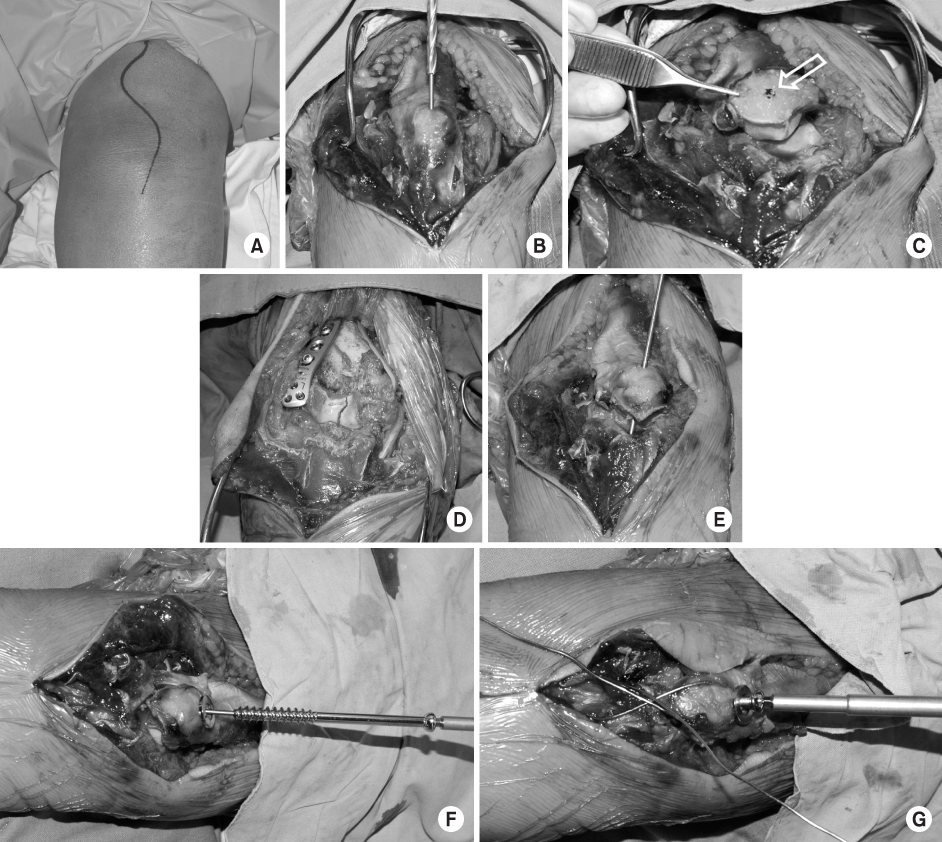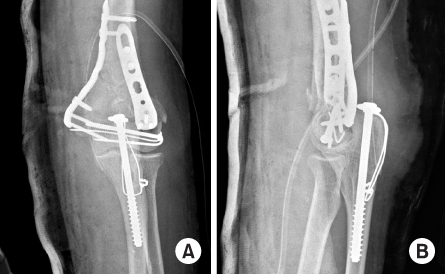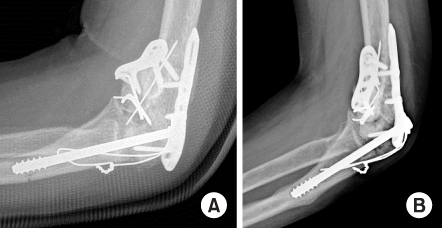J Korean Fract Soc.
2015 Apr;28(2):118-124. 10.12671/jkfs.2015.28.2.118.
Cannulated Screw and Wire Fixation with Predrilling for Olecranon Osteotomy in Intra-articular Comminuted Distal Humerus Fractures
- Affiliations
-
- 1Department of Orthopaedic Surgery, CHA Bundang Medical Center, CHA University, Seongnam, Korea. hsoohong@cha.ac.kr
- KMID: 2044019
- DOI: http://doi.org/10.12671/jkfs.2015.28.2.118
Abstract
- PURPOSE
The olecranon osteotomy in intra-articular comminuted distal humerus fractures is a suggested technique for excellent exposure of articular fractures. However, complications including delayed union, nonunion of osteotomy site have been reported. Authors have applied predrilling for cannulated screw before osteotomy for achievement of rapid and accurate reposition of separation part and added wire fixation for secure stability. The purpose of this study is to evaluate the efficacy of this fixation procedure following the olecranon osteotomy during the internal fixation of intra-articular fracture of the distal humerus.
MATERIALS AND METHODS
This study retrospectively analyzed 14 cases (9 women and 5 men) of intra-articular distal humerus fractures in which the olecranon osteotomy was applied. The mean age of patients was 53.4 years (range, 25 to 83 years), and the average follow-up period was 15.9 months. Eleven cases were classified as AO 13-C3, and the other 3 cases were AO 13-C2. Reduction accuracy, union period of osteotomy site on follow-up radiographs and postoperative complications related to olecranon osteotomy were evaluated.
RESULTS
All osteotomized parts showed no position change and solid union with normal alignment at the last follow-up. The mean period of bony union was 3.5 months (range, 2 to 5 months). There were no complications related to olecranon osteotomy except one case of non-displaced fracture of the proximal ulnar shaft at the level of cannulated screw tip caused by forceful passive physical therapy. It was managed by conservative treatment without further problem.
CONCLUSION
Predrilled cannulated screw and wire fixation following the olecranon osteotomy during internal fixation of intra-articular comminuted distal humerus fractures showed satisfactory results in the union of osteotomy site and it could be a recommendable procedure when fractures require olecranon osteotomy.
Keyword
MeSH Terms
Figure
Reference
-
1. Cassebaum WH. Operative treatment of T and Y fractures of the lower end of the humerus. Am J Surg. 1952; 83:265–270.
Article2. Cassebaum WH. Open reduction of T & Y fractures of the lower end of the humerus. J Trauma. 1969; 9:915–925.
Article3. Wilkinson JM, Stanley D. Posterior surgical approaches to the elbow: a comparative anatomic study. J Shoulder Elbow Surg. 2001; 10:380–382.
Article4. Illical EM, Farrell DJ, Siska PA, Evans AR, Gruen GS, Tarkin IS. Comparison of outcomes after triceps split versus sparing surgery for extra-articular distal humerus fractures. Injury. 2014; 45:1545–1548.
Article5. Coles CP, Barei DP, Nork SE, Taitsman LA, Hanel DP, Bradford Henley M. The olecranon osteotomy: a six-year experience in the treatment of intraarticular fractures of the distal humerus. J Orthop Trauma. 2006; 20:164–171.
Article6. Gainor BJ, Moussa F, Schott T. Healing rate of transverse osteotomies of the olecranon used in reconstruction of distal humerus fractures. J South Orthop Assoc. 1995; 4:263–268.7. Pajarinen J, Björkenheim JM. Operative treatment of type C intercondylar fractures of the distal humerus: results after a mean follow-up of 2 years in a series of 18 patients. J Shoulder Elbow Surg. 2002; 11:48–52.
Article8. Ring D, Gulotta L, Chin K, Jupiter JB. Olecranon osteotomy for exposure of fractures and nonunions of the distal humerus. J Orthop Trauma. 2004; 18:446–449.
Article9. Gebert C, Hillmann A, Schwappach A, et al. Free vascularized fibular grafting for reconstruction after tumor resection in the upper extremity. J Surg Oncol. 2006; 94:114–127.
Article10. Gupta R. Intercondylar fractures of the distal humerus in adults. Injury. 1996; 27:569–572.
Article11. Gupta R, Khanchandani P. Intercondylar fractures of the distal humerus in adults: a critical analysis of 55 cases. Injury. 2002; 33:511–515.
Article12. Wang AA, Mara M, Hutchinson DT. The proximal ulna: An anatomic study with relevance to olecranon osteotomy and fracture fixation. J Shoulder Elbow Surg. 2003; 12:293–296.
Article13. Henley MB. Intra-articular distal humeral fractures in adults. Orthop Clin North Am. 1987; 18:11–23.
Article14. Henley MB, Bone LB, Parker B. Operative management of intra-articular fractures of the distal humerus. J Orthop Trauma. 1987; 1:24–35.
Article15. Hutchinson DT, Horwitz DS, Ha G, Thomas CW, Bachus KN. Cyclic loading of olecranon fracture fixation constructs. J Bone Joint Surg Am. 2003; 85:831–837.
Article16. Ahmed AR, Sweed T, Wanas A. The role of cancellous screw with tension band fixation in the treatment of displaced olecranon fractures, a comparative study. Eur J Orthop Surg Traumatol. 2008; 18:571–576.
Article17. Pollock JW, Athwal GS, Steinmann SP. Surgical exposures for distal humerus fractures: a review. Clin Anat. 2008; 21:757–768.
Article
- Full Text Links
- Actions
-
Cited
- CITED
-
- Close
- Share
- Similar articles
-
- Surgical Treatment Strategy for Distal Humerus Intra-articular Fractures
- Treatment of Ankylosis of the Elbow Secondary to Failed Osteosynthesis of Intra-Articular Distal Humerus Fracture
- Treatment for Comminuted fractures of Distal End of Humerus by Newly Developed Anatomical Plate: Three case report
- Comparative study on Kirschner-wire and screw fixation for intra-articular fractures of the proximal phalanx head
- Triangular Fixation Technique for Bicolumn Restoration in Treatment of Distal Humerus Intercondylar Fracture




